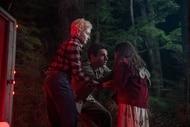'O Brother, Where Art Thou?' delights in the elasticity of fantasy
Now streaming on Peacock, the Coen Brothers adaptation of The Odyssey is quietly a fantasy classic.

In retrospect, it was probably a good thing that Coen Brothers adapted The Odyssey without ever actually reading it.
Homer's epic poem about a quest in the wake of the Trojan War still ranks as one of the most famous works in all of literature, so embedded in Western culture that even people who haven't read it know many of the basic beats through sheer force of cultural osmosis. The same was true of Joel and Ethan Coen, who more than two decades ago set out to make their own version of the epic in the Depression-era American South, and didn't even bother to check their work against the source material afterwards. In the end, they later said, co-star Tim Blake Nelson might have been the only person associated with the film to actually read The Odyssey.
The result of the Coens' exploration of The Odyssey, O Brother, Where Art Thou? (now streaming on Peacock for your watching pleasure), is therefore by necessity a loose adaptation based more on certain key scenes of the story than on the entire vast arc of Homer's narrative. The cyclops is there, and the sirens, and the need for the central character to get back home to his wife, but while they clearly give credit to the original story, the Coens also never seem entirely bound by it. In choosing a story so closely associated with all of Western literature, one that many of us study before we leave high school, the Coens proved the eternal elasticity of fantasy storytelling by weaving something that we could all recognize, even when making certain parts of it unrecognizable.
Because for all its Homerian influence, and its nods to other films (the title is taken from Preston Sturges' Sullivan's Travels), O Brother is unmistakably a confluence of the kinds of things the Coens love to include in their films. Its script provides numerous showcases for character actors ranging from John Goodman to Charles Durning to Stephen Root, while its Southern setting allows them to play with the language of the story much in the same way they did with their debut film, Blood Simple, and arguably their greatest achievement, No Country for Old Men. Then there's the period setting, which the Coens explained as a way to tap into the sense of exploring another world, a bit removed from reality.
"We tend to do period stuff because it helps make it one step removed from boring everyday reality," Ethan Coen told The Guardian in 2000.
This is true of many of the Coens' films, but it's especially important to O Brother, Where Art Thou? because of the trajectory the film takes in its adaptation of a story filled with monsters, magic, and great feats of heroism.
For much of the film, O Brother's version of The Odyssey plays like a more realistic approach to Homer's original story. The cyclops becomes a Bible salesman with an eyepatch. The sirens become three pretty women who use their wiles to lure the men in and then turn one of them over to the authorities in exchange for bounty money. Even the god Poseidon is represented by the evil sheriff who tries to capture Everett (George Clooney), Pete (John Turturro), and Delmar (Tim Blake Nelson), hampering the journey with repeated interruptions. There are of course, other parallels depending on who you ask, but so far each of these elements feels at least somewhat realistic, grounded in things that might actually happen to three escaped convicts on the lam.
The film could carry on with that sense of realism for its entire length, and still be a very solid adaptation of a classic story, but the Coens don't stop with real counterparts for Homer's mythic quest. Thanks to their script — full of secrets, references, and nods to things bigger than Everett and his pals — and the work of cinematographer Roger Deakins and his remarkable desaturation process on the film, O Brother becomes a fantasy of a different kind, rather than a realistic story pulled from a more fantastical source. The sheriff who hunts the boys might just be the devil himself, a dark man with fire burning in his black eyes. Big Dan Teague (John Goodman), the Cyclops who waylays Everett and Delmar, might actually be a superhuman force designed to hinder them on their journey. And then there's the finale, in which Everett prays to God for help and is answered by a flood. Yes, the flood was pre-planned, part of public works project, but its timing still suggests greater forces at work. It all adds up to a feeling that means the film's most memorable line — Delmar whispering "We thought you was a toad" at Pete — feels not just normal in this strange story, but flat-out logical.
While it may not be remembered as the Coens' greatest film, O Brother, Where Art Thou? remains one of their most fascinating and compulsively rewatchable, a compelling descent into a half-remember story that produces its own indelible version of a legendary narrative. It's proof of just how much fun you can have when you're willing to let your fantasy storytelling be a bit pliable, as well as proof of The Odyssey's enduring value.
O Brother, Where Art Thou? is now streaming on Peacock.

























